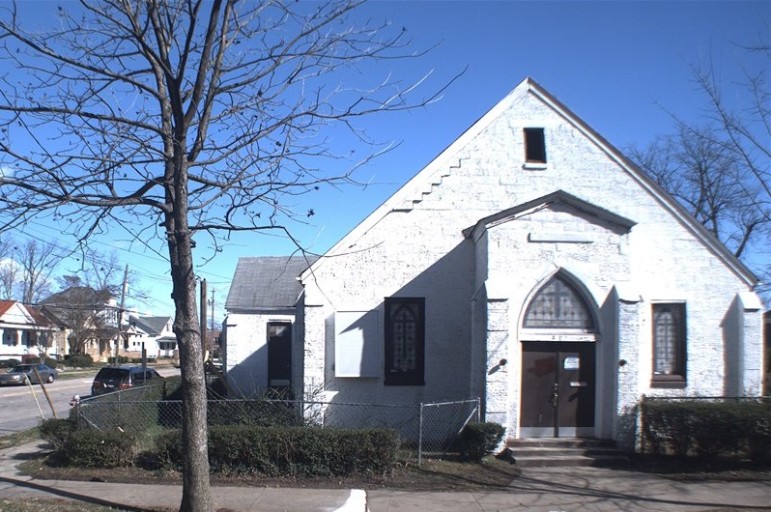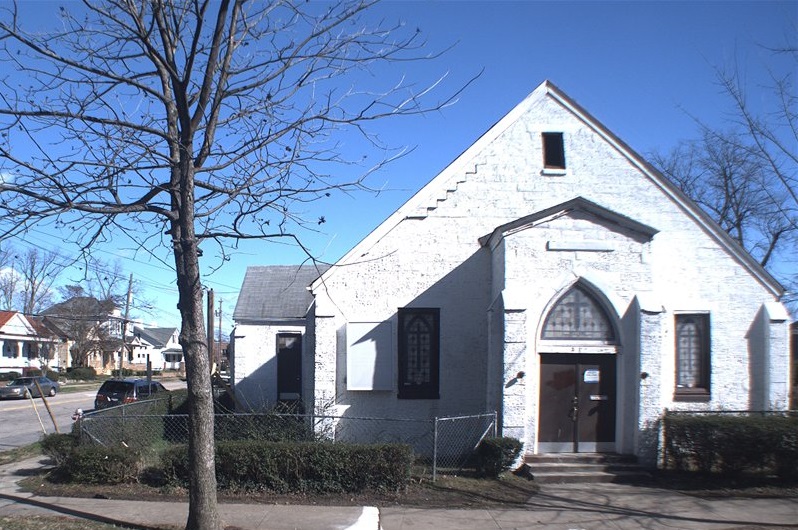City Council met Tuesday for its regular session, discussing two rezoning cases and voting to sell two city-owned properties.
One of those cases, Z-28-14, concerned the redevelopment of a former Seventh-Day-Adventist Church on South Person Street.

Wake County
A photo of the former Seventh Day Adventist Church in 2013
First filed in February 2014, the case received a recommendation of approval from the planning commission in April of this year, but has appeared before council for weeks as the applicant and the community tried to work out a compromise for the proposed restaurant establishment planned for the property.
During Tuesday’s session, Andy Petesch, the attorney for applicant Phuc Tran, told council that more conditions had been added to the case, including ones that would limit the amount of outdoor seating and another that would limit the hours to 10 p.m. Monday-Thursday, 11 p.m. on Fridays and Saturdays and 9:30 p.m. on Sundays.
Many in the community had asked that the applicant prohibit a restaurant altogether, as they felt the accompanying alcohol sales would be inappropriate for both the character of the neighborhood and the history of the building.
Councilor Kay Crowder asked Petesch if the limited hours of operation would be enough to sustain a business. Petesch replied that the applicant had researched similar businesses in other neighborhoods and concluded that his endeavor could be successful.
Councilor John Odom called for a vote on case, noting “This is one that we’ve asked to have conditions put on it, and it looks like they’ve added quite a few. I think we’ve come to the best possible conclusion we can on this one.”
The case was approved 6-2, with councilors Eugene Weeks and Russell Stephenson voting against it.
Rezoning case Z-12-15 was held for two weeks to allow the applicant time to submit an additional condition that the parcel would include a neighborhood grocery store with a pharmacy.

Bing Maps
The property in question
The parcel to be rezoned is located at the intersection of Buffaloe and New Hope Roads. The applicant, Lacy Reaves, stated that his client, WRS Inc., had met with the community numerous times to discuss how the parcel could be developed in line with the community’s vision.
Conditions added to the case included a one story height cap, limited hours of operation, and transit easements. The planning commission voted unanimous approval of the case and the local citizens advisory committee voted 40-12 in approval of the rezoning.
It was revealed that the condition to include a neighborhood grocery store and pharmacy was at the request of councilor Stephenson.
Councilors Split over Sale of City Properties
The disposition of two city-owned properties was approved by a 5-3 vote. The two properties in question are on located at 301 Hillsborough Street and 324 West Morgan Street.
The Lundy Group had offered $3 million for the two properties, which are now subject to an upset-bid process. That process would allow another developer to come in with a better offer and purchase the properties.
Councilor Stephenson spoke of the need to add a condition onto the property to develop it into a neighborhood grocery store. Councilor Gaylord expressed the need for conditions for use as well. They, along with councilor Crowder, voted against the disposition.
Construction Trends Drive Up Capital Project Costs
Ben Canada with the city’s the budget and management services department, presented to council an analysis of the impact of construction market trends on capital projects. He said while construction investment has been on the rise since 2011, many contractors had left the business due to the earlier recession.
This, combined with the acquisition of easements and the cost of site preparation, was driving up construction costs for capital projects.
Canada said the city was trying to combat this through better administrative efforts, such as contingency funds and coordinating resources with other projects, along with policy choices such as budget transfers and budgeted reserves.
The next step, he said, was to evaluate the cost inflation index.
